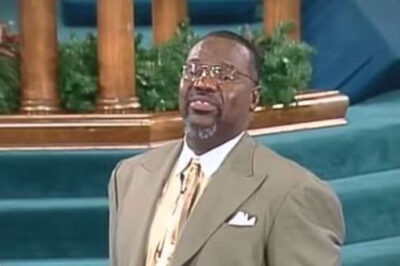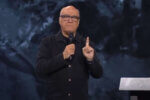Note: This article first appeared in the November 1996 issue of Charisma magazine.
Bishop T.D. Jakes is a man in motion. He steps across the stage, looking almost svelte after a recent 60-pound weight loss. He uses the kind of facial expressions that speak volumes. He hushes a buzzing sanctuary by reclining on the platform steps, hands raised upward to the God he serves. But whatever his physical stance, Bishop T.D.Jakes always wields the sword of the Spirit that inspires his powerful oratory.
“If you can control your soul, you can control your body,” he tells his congregation at the Potter’s House in Dallas. “You need the Word to get in your spirit so it can reach out and control your soul. Satan’s only access to you is through your senses.”
This day, Jakes again gets the reaction that greets him in every venue: People spontaneously leap to their feet to clap, dance, wave their hands—and shout: “C’mon, bishop! Preach it! Talk about it!”
His gift, says Holloway Gray, executive coordinator of T.D. Jakes Ministries, is his ability to provide a clear understanding of God’s Word via modern-day illustrations: “I think that gives a clarity and simplifies it so people can feel a part of it.”
That excitement reaches far beyond Dallas and the Texas borders. His ministry crosses boundaries of geography, race, ethnicity, class—and denomination.
“This is a great move of the Spirit,” says Bishop C.D. Owens, presiding bishop of the Church of God in Christ. “It used to be reserved for whites to get the crowds that Jakes pulls. But here is a black man who is bringing blacks and whites together in mass auditoriums. He has my prayers and support.”
Few pastors could move 1,100 miles to plant a church and soon fill its 5,000-seat sanctuary or place six of their books on the Christian Top 20 list between January and July of the same year.
But few pastors are like Bishop Jakes, whose seminal teaching, “Woman, Thou Art Loosed!” spawned national conferences and last year’s No. 2 best-selling Christian book. Despite his meteoric rise to fame, though, he remains friendly, humble and widely admired.
“Anointed is an understatement,” says elder Stanley Miller, senior pastor of Temple of Faith in Charleston, West Virginia, which Jakes founded in 1986. “That’s one of the highest accolades you can give a person. But, somehow for him that doesn’t say it all.”
“There’s something inside of him that comes flooding out,” says Sherman Watkins, presiding bishop of Higher Ground Assemblies, the Columbus, Ohio, Pentecostal fellowship that Jakes serves as vice bishop. “He’s pregnant with God’s purpose.”
To bask in the glow of his preaching is to experience a spiritual transformation as the world’s negative atmosphere fades into mere wisps. He delivers the Word in such lightning-rod fashion that he makes you believe that all things really are possible with God.
His appeal extends to all ages, according to Tim Anderson, youth pastor at Potter’s House. “Everyone is aware of the bishop. At his services I’ve seen kids 5, 6 and 7 (years old) getting filled with the Holy Spirit at the altar.”
Bishop Paul Morton, founder of the Full Gospel Baptist Church Fellowship, traces this impact to meeting the needs of hurting people. Morton points to the changed lives that followed Jakes’ sermon before 45,000 people at the fellowship’s mid-July convention.
“He has a special gift on his life,” says the pastor of St. Stephens Full Gospel Baptist Church in New Orleans. “The Lord places that gift on people for a season to change a generation.”
What is the message that has thrilled millions?
It is about God’s supernatural ability, bestowed by a Lord who is colorblind and cares about each person—a God who affirms the importance of women and equally appreciates men, a truth that Jakes believes can end the nation’s gender conflict.
“Femininity has its own fragrance,” Jakes counsels the thousands who flock to “Woman, Thou Art Loosed!” conferences. At his “Manpower” conferences, he stresses the need for men to live a disciplined life. That includes prayer, Scripture reading and meeting practical needs such as health and life insurance for one’s family.
Humble Beginnings
Although Jakes’ recent move to Dallas—which expanded the size of his congregation almost 10-fold—may seem to mark a sudden burst onto the national scene, he calls it a “misconception” to label him an overnight success.
Even as Moses had to spend years on the backside of the desert in preparation, 39-year-old Thomas Jakes has been preaching in obscurity for two decades. Jakes heard the call to preach after his father’s death from kidney disease brought him closer to the Lord.
“God spent a great deal of time getting me ready,” he recalls. “Nobody breaks on the scene without preparation. God tested and proved me in obscurity. He healed some things so that when He brought me to national prominence, He could trust me to stand up under the weight.”
A native of Charleston, West Virginia, Jakes grew up as a Baptist but was filled with the Holy Spirit at a storefront apostolic church. Soon he began traveling a circuit that today takes him before a range of denominations, races and cultures.
But in his pioneering times the settings were radically different. When he first preached around West Virginia’s storefronts and pot-bellied stoves, Jakes thrust his hands behind his back to camouflage the shaking.
He credits his parents with the solid upbringing that provided the education and work ethic he now draws on to handle his frantic preaching schedule.
His mother, Odith, part of the 50-member entourage of employees and their families who relocated to Dallas, was a teacher. Though she taught Jakes to read and write before grade school, her greatest contribution was instilling a positive attitude in the youngest of her three children.
“She taught me that I could do anything if I tried hard enough. I believe that nothing is withheld from a person who has effort, tenacity and God’s presence. Her affirmation has a lot to do with my self-esteem,” he said.
His father molded the drive that contributes to his strengths and weaknesses. Progressive and assertive, workaholic Earnest Jakes Sr. took a mop and a bucket and turned it into a prosperous janitorial service firm.
That was a tremendous endeavor for a member of the state’s tiny black minority in the 1960s, Jakes says. Although his father’s example taught him the value of hard work, it also gave him the tendency to spend too many hours away from home.
Every minister struggles with that, he says, and he seeks a balance through frequent contact with his children. Occasionally he takes them on the road, and he writes of them in some of the 14 books and workbooks he has published since 1993.
Despite his call to preach, it took a while for ministry to become a vocation. After high school he enrolled in West Virginia State University as a psychology major and completed his bachelor’s degree through correspondence courses. He also holds a master’s and doctorate in ministry.
He met Beckley, West Virginia, resident Serita Jamison and married her in 1980, taking a job at Union Carbide to support her—and the twin sons who followed, Jamar and Jermaine. At the plant he met Miller, who helped him build the baptistry at his first church. But before he stepped behind that pulpit, several years of hard times had intervened.
After a 1982 plant layoff, Jakes scrambled to survive on itinerant, low-paying speaking engagements. Though his brood would later include Cora, now 9; Sarah, 8; and T.D. Jr., 2, he struggled to fill four mouths.
Some details of that period in his life work their way into his sermon illustrations: how he earned extra money digging ditches, drove a battered old Valiant and preached in suits with worn-out linings. Today he lives far better, but his former associate pastor says he hasn’t changed.
“He’s the same man I knew 16 years ago,” says Miller. “If I was to describe him in one word, it would be ‘real.'”
Pulling Up Roots
After a lifetime in West Virginia, no one was more surprised than Jakes about his move to Texas. Though his packed conference schedule made airports a second home, he had always returned to his roots.
Earlier this year, when he learned that evangelist W.V. Grant’s Eagle’s Nest Family Church in Dallas was for sale, he called a friend to encourage him to buy it. After waking up one night and wrestling with the idea, Jakes recognized God’s hand at work. Coupled with a strong sense that his destiny no longer lay in his home state, Jakes moved forward.
After T.D. Jakes Ministries acquired the 28-acre site and nearby broadcast and print facilities for $3.2 million, he resettled in stages. Sunday night services started in May and morning worship followed in July.
The pews quickly filled—and resentment toward Jakes became a topic on local radio talk shows. Local pastors were upset over the prospect of losing members to him.
E.K. Bailey, pastor of Concord Baptist and vice president of the city’s African American Pastors Coalition, believes that dispute is confined to the Pentecostal-charismatic community. Saying he has heard only positive comments about Jakes, he calls him a solid Bible preacher: “As long as he keeps reaching people for Jesus, I have no problem with that.”
Even friends, such as Clifford Frazier of Heartline Ministries, wondered about the ramifications. Yet, the east Dallas pastor says those jealous of the bishop misunderstand God’s kingdom.
“The more churches we have, the better,” says Frazier. “This focuses attention on Dallas. I think people will be won to Christ, [people] who will seek out a church because they know of him.”
Despite the rumors, no one openly shared negative feelings with him. Jakes describes a warm, enthusiastic reception in Dallas that makes him optimistic about the future.
Not that the challenges will be easy. He says Dallas, whose ethnic mix is approximately 30 percent African American and 21 percent Hispanic, struggles with a seed of racism. Although he expects that from the world, he says it needs to be rooted out of the church. So do gender and denominational barriers, he believes.
Located in southwest Dallas, the Potter’s House is surrounded by open fields and is just west of a freeway spur that helps tie Dallas-Fort Worth into a metroplex with more than double the entire population of West Virginia.
Despite the size difference, there are similarities to Jakes’ old church. The ushers are women, members are polite, and Sunday morning services last three hours. Most important, the church plans the same social ministry and spiritual growth efforts that characterize the Temple of Faith in Charleston.
Among the outreaches underway or planned are food distribution, high school equivalency classes, training in completion of job applications, a summer day-camp for children of single parents, and a drug rehabilitation program known as Transformation.
An Anointed Leader
The 6-foot-4-inch preacher cuts such an imposing figure that locals speculated over whether he would inherit the mantle of the late S.M. Wright—a venerable Dallas clergyman whose influence extended beyond ministerial circles to local and state politics. Pastor Bailey doesn’t think so, saying Jakes hasn’t made himself available to ministerial or city leaders. Nor has Jakes ever mixed politics with faith.
However, Morton believes the bishop can have the impact of a Martin Luther King Jr., although in a different way. Terming him a “black Billy Graham,” the New Orleans pastor says Jakes can reach countless numbers of people and help straighten out their lives.
“The connection he has is drawing people spiritually and working on their minds. He can give them a sense of pride and understanding of who they are. If we can get someone started from a spiritual base, that’s a key,” Morton says.
Jakes not only speaks effectively to hurting individuals, his platform also gives him credibility with the church at large. He speaks of a similar theme of restoring broken vessels.
“It’s time for the body to mature to the point that we can accept diversity,” he says. “We [must] allow scarred, wounded people to be used by the Master and [realize] the oil does flow from broken vessels.
“I believe with all my heart that we have thrown away some of the most gifted, God-given people to the body of Christ that were meant to lead us into the next era of destiny. But because we saw their humanity, we failed to appreciate their divinity. I think we need to bring them back to the forefront at such a time as this.”
Jakes does that. A recent example is his invitation to Jim Bakker in April to give his testimony at a men’s breakfast during Jakes’ annual Back to the Bible Conference in Cincinnati. He reaches out across racial lines, too, and is delighted to see barriers fall, giving way to more interracial, interdenominational meetings.
“Blacks are coming into white surroundings, and whites are coming into black surroundings. We’re losing our fear of each other, which is the plan of the Lord. He prayed that we might be one, and maybe at last it’s coming to pass,” he says.
Because of his ardent opposition to the term “black church,” he is reluctant to discuss its contributions to the body of Christ. Yet he outlines several factors that have distinguished mostly black congregations: enriching the community; pressing for racial equality, both historically and currently; promoting gender equality; and providing musical talent.
The church has always been a central place of meeting and a focal point for our culture. Even how we see our ministers tends to be a little bit different because many of the great heroes of the African American community have come out of the church.
We esteem our ministers a little differently than other cultures do. What I foresee happening in our communities is a resurgence of church attendance. People are turning back to the church. They are turning back to God in unfathomable proportions.”
T.D. Jakes, it would seem, is one of the most prominent voices pointing those thirsting souls toward the Almighty.







Leave a Comment
You must be logged in to post a comment.